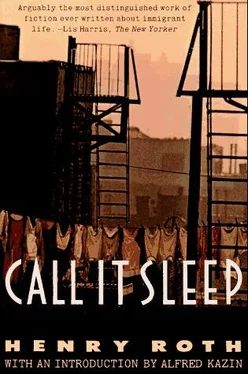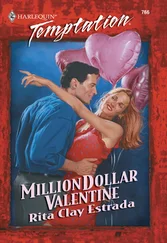On those infrequent occasions when his mother bought herself a dress, she sometimes frankly preferred to stand rather than sit down and wrinkle it. His aunt, on the contrary, made hers look like a limp rag so quickly that she would take her Sunday afternoon nap in a new dress to get over the feeling that she had to be solicitous about it.
Apart from their complete difference in appearance, David soon observed that his mother and Aunt were worlds apart in temperament. His mother was grave, attentive, mild in her speech: his aunt was merry, tart and ready-tongued. His mother was infinitely patient, careful about everything she did; his aunt was rebellious and scatter-brained.
“Sister,” she would tease, “do you remember that Salt Sea that grandfather used to speak of — by Judah or by Jordan, where-ever it was — no storms and it bore everything? That’s how you are. You use all your salt for tears. Now a wise woman uses some of it for sharpness.” Aunt Bertha used all of it.
III
ON a clear Sunday afternoon in July, David and his aunt set out together toward the Third Avenue Elevated. They were going to the Metropolitan Museum. Sweat runneled his aunt’s cheeks, hung down from her chin, fell sometimes, spotting the bosom of her green dress. With her handkerchief, she slapped at the beads viciously as though they were flies and cursed the heat. When they reached the elevated, David was compelled to ask innumerable people what the right train was, and during the whole trip, she sent him forward to plague the conductor.
At 86th Street, they got off and after further inquiry walked west toward Fifth Avenue. The further they got from Third Avenue, the more aloof grew the houses, the more silent the streets. David began to feel uneasy at his aunt’s loud voice and Yiddish speech both of which seemed out of place here.
“Hmm!” she marveled in resounding accents. “Not a single child on the street. Children, I see, are not in style in this portion of America.” And after gaping about her. “Bah! It is quiet as a forest here. Who would want to live in these houses? You see that house?” She pointed at a red brick structure. “Just such a house did Baron Kobelien have, with just such shades. He was an old monster, the Baron, may he rot away! His eyes were rheumy, and his lips munched as though he were chewing a cud. He had a back as crooked as his soul.” And in the role of the Baron, she tottered onto Fifth Avenue.
Before them, stood a stately white-stone edifice set in the midst of the green park.
“That must be it,” she said. “So they described it to me at the shop.”
But before they crossed the street, she decided to take her bearings and cautioned David to remember a certain brown-stone house with gabled roofs and iron railings before it. Thus assured of a certain return, they hurried across the avenue and stopped again at the foot of a flight of broad stairs that led up to a door. A number of people were going in.
“Whom shall we ask to make sure we are right?”
A short distance from the building stood a peanut-vender with his cart and whistling box. They walked over to him. He was a lean, swarthy fellow with black mustaches and bright eyes.
“Ask him!” she ordered.
“Is dat a museum?”
“Dotsa duh musee,” he flickered his eyebrows at her while he spoke. “You go inna straight,” he pushed out his chest and hips, “you come out all tire.”
David felt his arm clutched; his aunt hurried him away.
“Kiss my arse,” she flung over her shoulder in Yiddish; “What did that black worm say?”
“He said it was a museum.”
“Then let’s go in. The worst we can get is a kick in the rear.”
His aunt’s audacity scared him quite a bit, but there was nothing to do except follow her up the stairs. Ahead of them, a man and woman were on the point of entering the door. His aunt pressed his arm and whispered hastily.
“Those two people! They seem knowing. We’ll follow them till they come out again, else we’ll surely be lost in this stupendous castle!”
The couple before them passed through a turn-stile. David and his aunt did likewise. The others turned to the right and entered a room full of grotesque granite figures seated bolt upright upon granite thrones. They followed in their wake.
“We must look at things with only one eye,” she cautioned him, “the other must always be on them.”
And keeping to this plan, wherever their two unwitting guides strolled, his aunt and he tagged along behind. Now and then, however, when she was particularly struck by some piece of sculpture, they allowed their leaders to draw so far ahead that they almost lost them. This happened once when she stood gawking at the spectacle of a stone wolf suckling two infants.
“Woe is me!” Her tone was loud enough for the guard to knit his brows at her. “Who would believe it — a dog with babies! No! It could not have been!”
David had to pluck her dress several times and remind her that their companions had disappeared before she could tear herself away.
Again, when they arrived before an enormous marble figure seated on an equally huge horse, his aunt was so overcome that her tongue hung out in awe. “This is how they looked in the old days,” she breathed reverently. “Gigantic they were, Moses and Abraham and Jacob, and the others in the earth’s youth. Ai!” Her eyes bulged.
“They’re going, Aunt Bertha,” he warned. “Hurry, They’re going away!”
“Who? Oh, may they burst! Won’t they ever stop a moment! But come! We must cleave to them like mire on a pig!”
In this fashion, hours seemed to go by. David was growing weary. Their quarry had led them past miles and miles of armor, tapestries, coins, furniture and mummies under glass, and still they showed no sign of flagging. His aunt’s interest in the passing splendors had long since worn off and she was beginning to curse her guides heartily.
“A plague on you,” she muttered every time those walking ahead stopped to glance into a show case. “Haven’t you crammed your eyes full yet! Enough!” She waved her sopping handkerchief. “May your heart burn the way my feet are burning!”
At last the man ahead of them stopped to tell one of the uniformed guards something. Aunt Bertha halted abruptly. “Hoorrah! He’s complaining about our following him! God be praised! Let them kick us out now. That’s all I ask!”
But alas, such was not the case; the guards paid no attention to them, but seemed instead to be giving the others directions of some kind.
“They’re leaving now,” she said with a great sigh of relief. “I’m sure he’s telling them how to get out. What a fool I was not to have had you ask him myself. But who would have known! Come, we may as well follow them out, since we’ve followed them in.”
Instead of leaving, however, the man and woman, after walking a short distance, separated, one going into one door and one into another.
“Bah!” Her rage knew no bounds. “Why they’re only going to pee. Ach! I follow no longer. Ask that blockhead in uniform, how one escapes this jungle of stone and fabric.”
The guard directed them, but his directions were so involved that in a short space they were lost again. They had to ask another and still another. It was only by a long series of inquiries that they finally managed to get out at all.
“Pheh!” she spat on the stairs as they went down. “May a bolt shatter you to bits! If I ever walk up these stairs again, I hope I give birth to a pair of pewter twins!” And she yanked David toward their landmark.
* * *
His mother and father were home when they entered. His aunt sprawled into a chair with a moan of fatigue.
“You look as though you’ve stumbled into every corner of the world!” His mother seated him on her knee. “Where have you led the poor child, Bertha?”
Читать дальше












